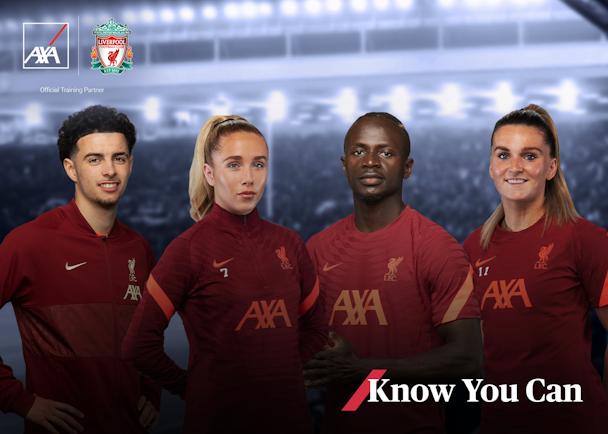How Axa has evolved its sports marketing playbook
Global insurance brand Axa is working on future-proofing its sports branding plans. Sabrina Cheung, chief brand and communications officer of Axa Asia shares the strategy with The Drum.

Axa's big bet on its sports marketing plans
The year 2020 was a watershed year for live event sponsorships that saw a huge dip in the wake of the pandemic. Interestingly it also forced marketers to start looking at newer ways of engaging with their target audience.
“Sports marketing is an integrated part of our brand strategy and aligns at a much deeper level with our desired brand positioning as a purpose-led business”, Sabrina Cheung, chief brand and communications officer of Axa Asia says in an exclusive chat with The Drum.
She shares the tenets of the leading financial services brand’s sports marketing playbook and how has it evolved to keep pace with the new rules of engagement and fandom.
Key pillars of Axa’s sports branding strategy
Sports marketing remains highly effective in helping the brand build its awareness and increase reach. Shares Cheung, “our strategic multi-year partnership with Liverpool Football Club enables us to connect with the club’s 402 million active followers worldwide, including in key markets across Asia and Africa.”
The Axa positioning of ‘Know you can’, symbolizes the brand’s promise to its customers as the encouraging partner who empowers them to live a better life. The company’s sports marketing strategy is built around driving brand loyalty, enabling digital activation and engaging stakeholders including customers, corporate partners, agents and employees, she adds.
How has the Axa collaboration with Liverpool Football Club evolved
Axa became Liverpool Football Club’s (LFC) global insurance partner, the club’s first, in October 2018. This was followed by it becoming an official principal partner of LFC and official training kit partner in May 2019 and securing naming rights to the team’s new training centre in 2020. This partnership also includes the women’s team and youth teams.
“Our multi-year partnership expresses Axa and LFC’s shared goal of promoting health, well-being and confidence”, says Cheung. Elaborating about how this association between a world-leading insurance company and one of the world’s most famous football clubs has evolved in the post-pandemic world. Cheung says it has taken the form of raising awareness about meaningful, emotional topics such as healthy lifestyles, mental well-being, and self-confidence – all highly important amid the pandemic – across external and internal communications channels, from podcasts to staff town halls. When done right, this approach can enable the brand to connect better with stakeholders at a deeper level.
Emerging face of fandom-building for brands
A key trend, says Cheung, has been the change in consumer behaviour. “Consumers these days follow brands that they can relate to and that stand for the same things they care about, such as positive mental health, an environmental mission or progressive diversity goals.”
Fandom, thus going forward is going to be about understanding fans’ needs and purposes, creating content that resonates, and building authentic and lasting relationships with them, she adds. Interestingly this also means that athletes, teams or events that have a purpose will become more attractive, as they can help brands to further strengthen their own purpose-led messaging.
Future of sports sponsorship in the post-pandemic world
The effect of the pandemic on live international sport in terms of in-person audiences and offline events has had a huge impact on how a sponsored asset will be used, going forward, to engage key stakeholders. For example, event cancellations meant the loss of B2B hospitality opportunities, as well as a loss of access to unique experiences that could excite fans and non-fans alike. That also underpins the imminent need for marketers to think of newer ways of engagement.
Adds Cheung, “to engage fans, we must now ask how to offer them something that is as good as being in the stadium itself, while for non-fans we must consider how to make them feel proud and included in the partnership.”
Making global assets locally relevant
While the LFC partnership is truly global, the brand ensures that it is able to develop regional assets that can be tailored to local needs, enabling markets to benefit from a greater degree of relevance and create content that works for Europe, Asia and Africa, rather than a centralized system, shares Cheung.
Along with the global association with LFC, Axa also complements it with locally relevant partnerships at the market level that includes the NBA in the Philippines and the Indonesian Basketball League.
Making sports marketing human and relatable
A major shift among the successful sports marketers has been the learning that whatever a company sponsors, it doesn’t have to be just for the fans of that asset – it can go further. This has been especially true when the pandemic’s challenges can make sponsorship a harder sell to internal stakeholders, adds Cheung.
Thus, the brand started looking at how it positioned the club’s players – by looking at them as brothers, sisters and partners, individuals who feel stress and anxiety. She says, “we learned to work with them as humans rather than superheroes which enabled us to connect and resonate in a far more effective way.”
Walking the talk
The brand created a video series for International Women’s Day 2020 where Gordon Watson, CEO of Axa Asia and Africa, talked to LFC women’s team players about their inspiring stories of how they pursued their dreams and overcame different challenges. The emotional storytelling worked well and was aligned with the brand positioning, says Cheung.
Interestingly, the human approach was also deployed for more light-hearted content to engages non-fans – the brand tried it with a recent ‘slang challenge’ video featuring player Trent Alexander Arnold teaching viewers how to talk like a scouser!
Mental health has been a key theme and to spread the message, the brand engaged with team captain Jordon Henderson for an online talk around ‘World mental health’ day that reached an estimated 34 million users.

